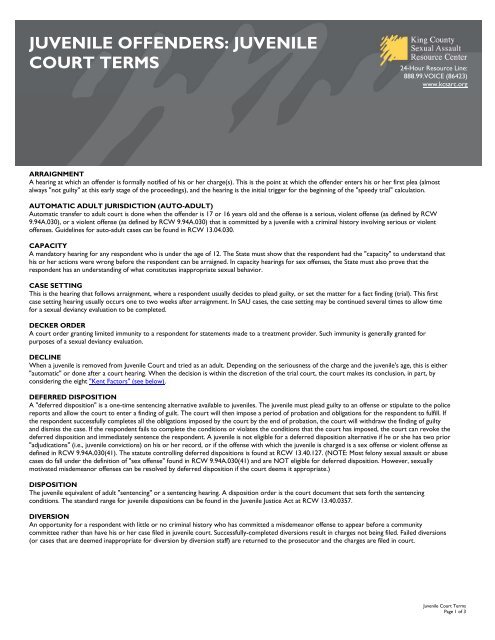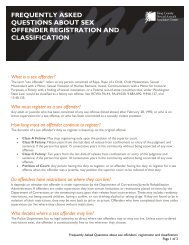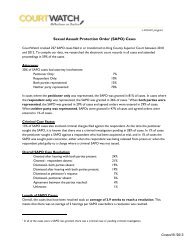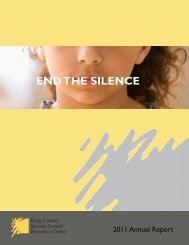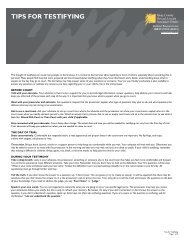juvenile court terms - King County Sexual Assault Resource Center
juvenile court terms - King County Sexual Assault Resource Center
juvenile court terms - King County Sexual Assault Resource Center
Create successful ePaper yourself
Turn your PDF publications into a flip-book with our unique Google optimized e-Paper software.
JUVENILE OFFENDERS: JUVENILE<br />
COURT TERMS<br />
24-Hour <strong>Resource</strong> Line:<br />
888.99.VOICE (86423)<br />
www.kcsarc.org<br />
ARRAIGNMENT<br />
A hearing at which an offender is formally notified of his or her charge(s). This is the point at which the offender enters his or her first plea (almost<br />
always "not guilty" at this early stage of the proceedings), and the hearing is the initial trigger for the beginning of the "speedy trial" calculation.<br />
AUTOMATIC ADULT JURISDICTION (AUTO-ADULT)<br />
Automatic transfer to adult <strong>court</strong> is done when the offender is 17 or 16 years old and the offense is a serious, violent offense (as defined by RCW<br />
9.94A.030), or a violent offense (as defined by RCW 9.94A.030) that is committed by a <strong>juvenile</strong> with a criminal history involving serious or violent<br />
offenses. Guidelines for auto-adult cases can be found in RCW 13.04.030.<br />
CAPACITY<br />
A mandatory hearing for any respondent who is under the age of 12. The State must show that the respondent had the "capacity" to understand that<br />
his or her actions were wrong before the respondent can be arraigned. In capacity hearings for sex offenses, the State must also prove that the<br />
respondent has an understanding of what constitutes inappropriate sexual behavior.<br />
CASE SETTING<br />
This is the hearing that follows arraignment, where a respondent usually decides to plead guilty, or set the matter for a fact finding (trial). This first<br />
case setting hearing usually occurs one to two weeks after arraignment. In SAU cases, the case setting may be continued several times to allow time<br />
for a sexual deviancy evaluation to be completed.<br />
DECKER ORDER<br />
A <strong>court</strong> order granting limited immunity to a respondent for statements made to a treatment provider. Such immunity is generally granted for<br />
purposes of a sexual deviancy evaluation.<br />
DECLINE<br />
When a <strong>juvenile</strong> is removed from Juvenile Court and tried as an adult. Depending on the seriousness of the charge and the <strong>juvenile</strong>'s age, this is either<br />
"automatic" or done after a <strong>court</strong> hearing. When the decision is within the discretion of the trial <strong>court</strong>, the <strong>court</strong> makes its conclusion, in part, by<br />
considering the eight "Kent Factors" (see below).<br />
DEFERRED DISPOSITION<br />
A "deferred disposition" is a one-time sentencing alternative available to <strong>juvenile</strong>s. The <strong>juvenile</strong> must plead guilty to an offense or stipulate to the police<br />
reports and allow the <strong>court</strong> to enter a finding of guilt. The <strong>court</strong> will then impose a period of probation and obligations for the respondent to fulfill. If<br />
the respondent successfully completes all the obligations imposed by the <strong>court</strong> by the end of probation, the <strong>court</strong> will withdraw the finding of guilty<br />
and dismiss the case. If the respondent fails to complete the conditions or violates the conditions that the <strong>court</strong> has imposed, the <strong>court</strong> can revoke the<br />
deferred disposition and immediately sentence the respondent. A <strong>juvenile</strong> is not eligible for a deferred disposition alternative if he or she has two prior<br />
"adjudications" (i.e., <strong>juvenile</strong> convictions) on his or her record, or if the offense with which the <strong>juvenile</strong> is charged is a sex offense or violent offense as<br />
defined in RCW 9.94A.030(41). The statute controlling deferred dispositions is found at RCW 13.40.127. (NOTE: Most felony sexual assault or abuse<br />
cases do fall under the definition of "sex offense" found in RCW 9.94A.030(41) and are NOT eligible for deferred disposition. However, sexually<br />
motivated misdemeanor offenses can be resolved by deferred disposition if the <strong>court</strong> deems it appropriate.)<br />
DISPOSITION<br />
The <strong>juvenile</strong> equivalent of adult "sentencing" or a sentencing hearing. A disposition order is the <strong>court</strong> document that sets forth the sentencing<br />
conditions. The standard range for <strong>juvenile</strong> dispositions can be found in the Juvenile Justice Act at RCW 13.40.0357.<br />
DIVERSION<br />
An opportunity for a respondent with little or no criminal history who has committed a misdemeanor offense to appear before a community<br />
committee rather than have his or her case filed in <strong>juvenile</strong> <strong>court</strong>. Successfully-completed diversions result in charges not being filed. Failed diversions<br />
(or cases that are deemed inappropriate for diversion by diversion staff) are returned to the prosecutor and the charges are filed in <strong>court</strong>.<br />
Juvenile Court Terms<br />
Page 1 of 3
FACT FINDING<br />
The term for a <strong>juvenile</strong> trial under the Juvenile Justice Act. This proceeding is also referred to as an "adjudicatory hearing", because it is the time when<br />
a <strong>juvenile</strong>'s case is decided or "adjudicated." Unlike an adult criminal trial, a <strong>juvenile</strong> fact finding takes place in a fairly small <strong>court</strong> without a jury. The<br />
judge is the "trier of fact" and rules not only on legal issues, but also makes the ultimate decision on guilt. As in an adult trial, parties at the <strong>juvenile</strong> fact<br />
finding may make opening statements and closing arguments, the parties may call witnesses to testify, and the parties may offer exhibits. As with an<br />
adult defendant, a <strong>juvenile</strong> respondent is presumed innocent and may choose not to testify. The State bears the burden of proof at a <strong>juvenile</strong> fact<br />
finding-just as with an adult trial-and the prosecutor must prove all the elements of the crime beyond a reasonable doubt.<br />
FIRST APPEARANCE HEARING<br />
The hearing within 48 hours of a <strong>juvenile</strong>'s arrest, at which time the <strong>court</strong> will determine whether probable cause exists for the <strong>juvenile</strong> to be held in<br />
custody. This is also called the "investigation" or "probable cause" hearing. If a <strong>juvenile</strong> is held in custody, charges must be filed within 72 hours or the<br />
<strong>juvenile</strong> is released. If the youth is held in custody and charges are, in fact, filed, the youth will be arraigned shortly after the expiration of the 72 hours.<br />
INSUFF OR INSUFFICIENT FINDING<br />
A case returned by the prosecuting attorney to the referring police agency because it has been found insufficient for the filing of a charge in <strong>court</strong>. This<br />
may be because of legal or factual challenges that cannot be overcome, missing witnesses, because the person is under 12 and the prosecutor does not<br />
believe capacity can be proven, or simply because the person has turned 18 and must now be filed on as an adult. An adult case that is not filed is<br />
called a "decline" - however, in <strong>juvenile</strong> <strong>court</strong> the term "decline" has a different meaning (see above), and thus the term "insufficient" is used.<br />
JJA<br />
Abbreviation commonly used for the Juvenile Justice Act, found in RCW 13.40.<br />
JRA<br />
The Juvenile Rehabilitation Administration, part of the Washington Department of Social and Health Services. JRA is responsible for long-term <strong>juvenile</strong><br />
commitment beyond "local sanctions." The difference between "detention" in a local <strong>juvenile</strong> facility and a commitment to JRA would be similar to the<br />
difference between the <strong>King</strong> <strong>County</strong> Jail and a prison commitment for an adult. Echo Glen and Green Hill are two examples of JRA facilities.<br />
JUVENILE PROBATION COUNSELOR OR JPC<br />
Juvenile Probation Counselors, or JPC's, work for the <strong>King</strong> <strong>County</strong> Superior Court and supervise youth who are charged with, or who have been<br />
found guilty of, an offense. Unlike with adult offenders, JPC's enter the process while charges are still pending. The <strong>juvenile</strong> will likely have one JPC<br />
while charges are pending and a different JPC after his or her conviction.<br />
KENT FACTORS<br />
The eight guiding factors a <strong>court</strong> weighs during a decline hearing to determine whether a respondent should be tried as a <strong>juvenile</strong> or an adult (from the<br />
United States Supreme Court case of Kent v. United States, 383 U.S. 541, 17 L.Ed.2d 84, 86 S.Ct. 1045 (1966)). These factors include (1) the<br />
seriousness of the alleged offense and the need to protect the community; (2) whether the alleged offense was committed in an aggressive, violent,<br />
premeditated or willful manner; (3) whether the alleged offense was against persons or against property; (4) the prosecutive merit of the complaint;<br />
(5) whether there are adult co-defendants that should be tried with the <strong>juvenile</strong> in a single proceeding; (6) the sophistication and maturity of the<br />
<strong>juvenile</strong>; (7) the record and previous criminal history of the <strong>juvenile</strong>; and (8) the prospects for adequate protection of the public and the likelihood of<br />
reasonable rehabilitation of the <strong>juvenile</strong> by the use of procedures, services and facilities currently available to the Juvenile Court.<br />
LOCAL SANCTION OFFENSE<br />
An offense for which the standard sentencing range--based on the seriousness of the crime and the <strong>juvenile</strong>'s criminal history-is no greater than a<br />
commitment to the local detention facility for 30 days. When a <strong>juvenile</strong> offense is a local sanction offense, the <strong>court</strong> can impose a disposition anywhere<br />
within a range on four different categories: community supervision, or probation (0-12 months); community service hours (0-150 hours); a monetary<br />
fine (0-$500); and/or detention (0-30 days). "Detention" can mean secured detention in the local <strong>juvenile</strong> facility, or may mean an alternative to<br />
secured detention (ASD), such as work crew, day reporting, electronic home monitoring, etc. A disposition over 30 days would require a commitment<br />
to the Juvenile Rehabilitation Administration (JRA), and places the respondent under the authority of the Department of Social and Health Services<br />
(DSHS).<br />
MANIFEST INJUSTICE<br />
A disposition above or below the standard sentencing range for the offense as established by the Legislature. To impose such a sentence, the <strong>court</strong><br />
must find from the record that substantial and compelling reasons support the conclusion that the standard range would effect a "manifest injustice,"<br />
i.e., that the standard range would be too harsh or too lenient in the context of all the circumstances.<br />
M.I.<br />
These initials are used in two different ways: when a referral is first reviewed by a prosecutor, the case is sometimes returned to the referring police<br />
agency for "more information." When used in a disposition context, "M.I." also can mean a "manifest injustice" sentence above or below the standard<br />
range for the offense (see above).<br />
MODIFICATION HEARING<br />
When a youth violates the <strong>court</strong>-ordered <strong>terms</strong> of his or her community supervision (probation), a modification hearing will be held. The judge will<br />
often order the youth to do time in detention as a consequence of the violation of a <strong>court</strong> order.<br />
RESPONDENT<br />
The term for a <strong>juvenile</strong> charged with an offense under the Juvenile Justice Act. Similar to the adult term "defendant."<br />
Juvenile Court Terms<br />
Page 2 of 3
SPECIAL SEX OFFENDER DISPOSITION ALTERNATIVE (SSODA)<br />
A person who is convicted of a sex offense may ask the <strong>court</strong> for a SSODA, which is nearly identical to the adult SSOSA. When a SSODA is granted,<br />
the respondent's sentence is suspended pending a 24-month period of community-based treatment and supervision. If the respondent fails to abide by<br />
the conditions of his or her treatment and supervision, the SSODA can be revoked by the <strong>court</strong>, and the respondent is then required to serve time at<br />
a JRA institution or in <strong>juvenile</strong> detention.<br />
SPEEDY TRIAL<br />
The time period during which an offender must be brought to trial by the State. While "speedy trial" is a constitutional right, that precise time period<br />
is not defined in the Constitution and varies from state to state. For <strong>juvenile</strong> offenders in Washington, the speedy trial for an offender in custody is 30<br />
days after arraignment; for a <strong>juvenile</strong> offender out of custody, the speedy trial for an offender is 60 days after arraignment. Continuance requests by<br />
the defense, "good cause" found by the <strong>court</strong>, and other factors often delay this period beyond the 30 or 60 day period.<br />
For more information, please contact Legal Advocacy 425.226.5062 or email clientservices@kcsarc.org<br />
Juvenile Court Terms<br />
Page 3 of 3


